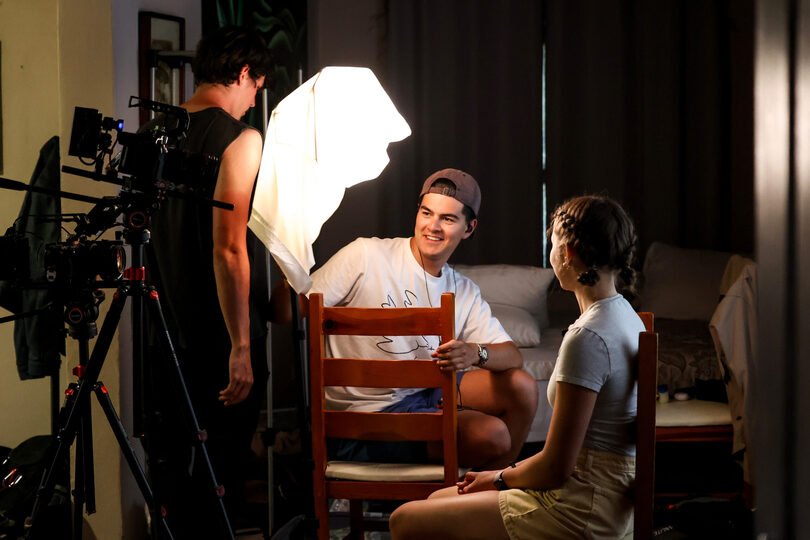SU student creates ‘Fuerza En Una Sonrisa’ documentary in 3-week Mexico trip

The subjects of Lucas Esquivel's "Fuerza En Una Sonrisa" are Jesús and María Ramírez. Jesús was born with a spinal disability and clubfoot; his mother María has spent her life helping Jesús live as normal a life as possible, she said in the documentary. Courtesy of Robin Canfield
Get the latest Syracuse news delivered right to your inbox.
Subscribe to our newsletter here.
Syracuse University senior Lucas Esquivel and his documentary team landed in central Mexico, prepared to interview doctors. While touring the hospital’s facilities, the crew was introduced to María and Jesús Ramírez, who quickly became their new documentary subject.
“He just had such a joy for life that most of us if we had his hardship, we wouldn’t be able to do,” Esquivel, a television, radio and film major, said.
Esquivel and students from other schools around the world created “Fuerza En Una Sonrisa” — translating to “strength in a smile” in English — this summer through Actuality Abroad, which works with organizations in low-income areas to produce documentaries. They completed the project and screened it in early August, and the documentary was also posted to Vimeo.
When the group landed, they were introduced to Patronato Pro Niños, an organization that provides medical, dental and mental health care to low-income children in the area. Through that, the crew met Jesús and María who became the film’s subjects.
Jesús was born with a spinal disability and clubfoot, which points his foot inward. His strength and smile inspired the name behind the crew’s documentary: “Fuerza En Una Sonrisa.” María, who takes Jesús to Patronato Pro Niños, has spent her life helping Jesús live as normal a life as possible, she said in the documentary. Despite his condition, Jesús acts like any other kid — playing on the playground, laughing and, most notably, making funny faces at the camera, Esquivel said.
Eventually, the group started following María and Jesús around, filming their daily lives.
Maija Angell, a producer of the documentary and student at Eastern Washington University, said she was excited for the trip, but the tone changed once María started sharing her story with the crew.
“It started to feel heavier and more responsibility on our shoulders because she started talking about her struggles and just started crying and we had barely said a couple words,” Angell said.
But over time, María became more comfortable and insisted she tell her story about her life and experience as a mother, Angell said.
The language barrier added another layer of difficulty and confusion, Esquivel said. Although Esquivel knows some Spanish, it was difficult to understand every conversation in the editing process.
Every interview went through a translator, and at some points, much of the emotion and conversation seemed to be getting “lost in translation,” Esquivel said. But the group pushed forward and found a groove, learning more about María’s daily life.
While Jesús’ condition is a key part of the film, both Esquivel and Angell agreed that María is the true protagonist. From showcasing her and Jesús taking long bus rides to the hospital, to taking on the challenging role of a mother, the team wanted to emphasize her commitment to her son.

SU senior Lucas Esquivel was the editor for the documentary, “Fuerza En Una Sonrisa.” The process was lengthy but rewarding, he said. Isabella Flores | Staff Photographer
Angell called the relationship “beautiful,” describing the amount of passion and love she has for her son. While the interview was flooded with tears, it ended up being an incomparable display of resilience, Angell said.
“We were like, ‘She’s fragile.’ She wasn’t,” Angell said. “She was one of the strongest people I’ve ever met.”
Robin Canfield, co-founder and director of international programs at Actuality Abroad, said each trip takes months to plan — from selecting the location to finding changemakers, nonprofits and geosocial enterprise groups the program works with. The crew begins the actual filming process after two weeks of planning.
Esquivel was the editor for the documentary, but came into the trip with little filmmaking experience. While he’s produced stories in his TRF classes, it was an adjustment to make one with such personal depth.
“It was definitely a learning curve at first,” Esquivel said. “There’s a lot more work that goes into it than you think.”
After the three weeks of planning and filming came 10 straight days of editing. Esquivel combed through hours of footage and interviews, eventually cutting it down to 10 minutes. Esquivel said the editing process was intimidating, but his cultural experience in the country helped tell the story.
The program’s goal is for students to grow as not only storytellers, but also as people, Canfield said. He advises people who join that they must overcome obstacles and push through the impromptu schedule.
“Week one is very planned out with our lessons, week two is a lot more meetings and then week three is blank,” Canfield said. “It’s a really big wall for some people.”
Esquivel said he wanted the audience to connect with María and everything she does for Jesús because everyone can relate to helping someone whose “life isn’t going smooth.” Esquivel said María cared about her son more than anything. María helped Jesús get the right care for his disability, and Jesús helped María through his love and affection he showed his mom.
Esquivel said through María and Jesús, he learned a great deal about storytelling, but also about himself and the situation that he’s lucky enough to be in.
“Even though he’s gone through all this, he still has a joy,” Esquivel said. “I think that’s something we could all really take a lot away from him.”





